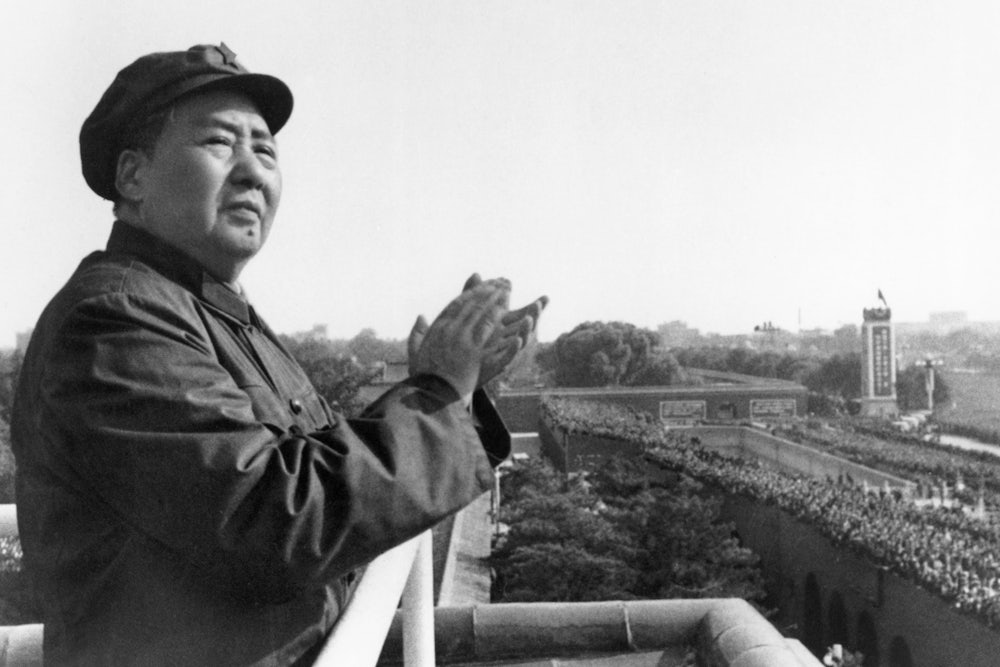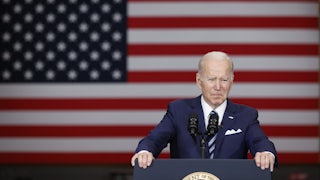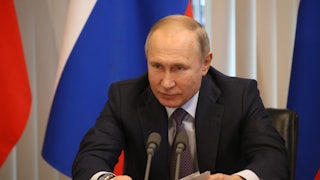An obviously fatigued but resolute Joe Biden on Friday afternoon sent a familiar message to Vladimir Putin, warning that an invasion of Ukraine would launch “a catastrophic and needless war of choice.” Putin’s target is not just the border regions, he said, but the Ukrainian capital of Kyiv—a “rapidly escalating crisis” that, to those of us following from home, sometimes has the grim inevitability of a train wreck. No wonder the World War II analogies are inescapable.
Putin’s disinformation campaign echoes the Nazis’ fabrication of an ersatz Polish attack on a German border radio station to justify their September 1, 1939, invasion. Kyiv resembles Paris in June 1940 as German troops neared. Yet in Paris, even as policemen carried rifles ostensibly to shoot down parachutists, the cafés were open late, and proprietors ransacked their cellars to reward loyal customers with their best bottles. It is not without inadvertent irony that Vice President Kamala Harris is conferring with our European allies at an annual security conference—in Munich, Germany.
But there are obvious limits to these World War II parallels—too many to name. In fact, another 1940s global cataclysm seems far more apt for Americans confronting the sad-eyed fate of Ukraine.
In late 1949, the Chinese Communists took control of the mainland as Chiang Kai-shek and the battered Nationalists retreated to Taiwan. The victory of Mao Zedong prompted right-wing Republicans to create a slogan that fueled conspiracy theories for more than a decade: “Who lost China?” By May 1950, the liberal Washington Post editorial page was loudly lamenting the potency of this McCarthyite question: “So much pain and passion is evoked in Who Lost China! that the man from Mars would think that nothing less than a piece of American territory had been stolen. It is as if a sort of California had been severed from the Union.”
Of course, China was never ours to lose.
In early 1948, Secretary of State George Marshall candidly told a House committee in secret session that it had been obvious since World War II ended that it would be “impossible” for the Chinese government “to conquer the Communist armies by force.” Despite subsequent GOP charges, it wasn’t phantom Communists in the State Department who delivered China to Mao but the Chinese themselves, in their reluctance to support a corrupt and weak government under Chiang.
Although Harry Truman was often exasperated by Chiang, the president never made aid to the Chinese contingent on digging up dirt on Tom Dewey, the 1948 Republican nominee. But that was precisely what Donald Trump did to Ukraine in 2019, prompting his first impeachment. It is easy to forget amid Trump’s other impeachable offenses that his “perfect call” to Ukrainian President Volodymyr Zelenskiy was a shakedown operation illegally offering to swap congressional appropriated aid for incriminating information about Hunter Biden.
If Russia invades—which could happen as early as this weekend—it is easy to imagine the wave of amnesia that will afflict Fox News Republicans. Within hours, the new right-wing mantra will likely become, “Who lost Ukraine? It’s Joe Biden.”
The complexities of Putin’s behavior and his resentments of the West, dating back to the breakup of the Soviet Union in 1991, will be ignored. In their place, Republicans will undoubtedly claim that the American ragtag abandonment of Afghanistan and Biden’s purported weakness were the only goad that Putin needed to launch the most frightening shooting war in Europe since 1945.
Such belated hawkishness is at odds with Trump’s proven scorn for NATO, Europe, and democracy. It is also out of line with the sentiments of most GOP voters. A new Quinnipiac University poll found that just 8 percent of Republicans approve of how Biden has been handling the “tensions between Russia and Ukraine.” Of course, some of this disapproval is a reflexive GOP reaction to just the name Biden. But what is striking in the Quinnipiac survey—one of the rare recent polls to examine Ukraine in depth—is a degree of GOP isolationism unrecognizable to those who remember Republicans under Ronald Reagan and George W. Bush. Democrats, according to Quinnipiac, support by more than a three-to-one margin sending U.S. troops to buttress NATO allies like Poland. In contrast, more Republicans (47 percent) are opposed to fulfilling our commitments to NATO than support them (43 percent).
The truth is that Biden has adroitly played a weak hand well, but there is a limit to how much you can pull off when your best card is a seven of clubs. Whether it has been fostering the unity of NATO or playing mind games with Putin by announcing his schemes and dreams in advance, Biden and his national security team deserve credit for both clarity and boldness. The Economist, not always a fan of Democratic presidents on foreign policy, went out of its way to stress, “Led by Joe Biden, who once called Mr Putin ‘a killer’ and surely loathes the man who tried to deny him the presidency, the West has agreed on a tougher package of threatened sanctions than in 2014, when Russia annexed Crimea.”
Success in politics is measured by outcomes rather than tactical shrewdness. Biden’s firmness in the biggest great-power crisis of his presidency will be mostly forgotten if Putin launches a direct assault on Ukrainian forces. Unless America and NATO are willing to send troops to battle Russia—a risky escalation that few leading figures support—our powers are limited. Despite GOP conspiracy-mongering ahead, the honest answer to the question “Who lost Ukraine?” has to be, as with China, that it was never ours to lose.






